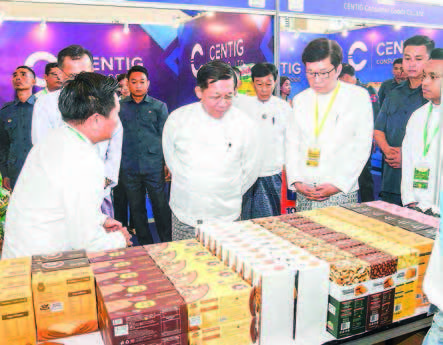Economists have to analyze how to tackle the State economy based on basic data of the nation and implement short- and long-term plans for different regions.
Senior General Min Aung Hlaing stressed the need to analyze economic crises based on political and economic problems from the point of view of macroeconomics and political economics.
Chairman of the State Administration Council Prime Minister Senior General Min Aung Hlaing said so at the ceremony to mark the 100th anniversary of economics education in Myanmar at Myanmar International Convention Centre II in Nay Pyi Taw yesterday morning.
Speaking on the occasion, the Senior General noted that protectionism is prioritized to overcome challenges of geopolitics, geoeconomic tensions, outbreak of pandemics, impacts of natural disasters, trade and monetary problems, technological competitiveness and difficulties of energy security.
He unveiled that the State Administration Council has been striving to overcome disturbances, hindrances and crises in the State economy through various ways and means since its establishment.
He emphasized that priority is given to equal opportunities for the development of all sectors and employment opportunities in relevant areas for national races.
The Senior General pointed out that the capacity to fully apply economics plays a key role in the economic growth of the State.
He noted that emphasis must be placed on raising productivity, quality products and grasping market share for products of the country to increase income for the State by creating incentives for those who strive for the economic development of the nation.
He urged businesspersons, those serving in government organizations and non-government organizations, economists, leaders in the economic development of the nation and investors to actively implement objectives and the roadmap of the State.
He called on economists to analyze how to tackle the State economy based on basic data of the nation and implement short-and long-term plans for different regions.
The Senior General highlighted that only when Myanmar doubles its export volume will it contribute to the development of the nation. Hence, efforts must be made to boost production based on agriculture and livestock tasks. Moreover, it is necessary to improve the industries based on cotton, bamboo and rubber raw materials, he added.
He underscored that as some 90 per cent of the State GDP depends on the production of private businesses, agro-based industry must be implemented in addition to the development of MSME businesses to raise export volume and reduce imports.
Under the leadership of veteran economists of Myanmar Sayagyi Dr Hla Myint, Dr Aye Hlaing, Dr Maung Shein and Dr Than Nyun in successive eras, the Senior General recounted that universities of economics have turned out 96,696 graduates and are giving training to 19,042 students within 100 years period.
Meanwhile, he explained that Universities of Distance Education have produced 170,930 graduates in economics. Universities in regions and states offer BA (Economics) courses to turn out human resources from an economic point of view.
At the ceremony, the Senior General and attendees watched a video clip on the 100th anniversary of Myanmar’s economics education.
Patron of the organizing committee Dr Than Nyun spoke words of appreciation while Chairman of the Leading Committee Union Minister for Investment and Foreign Economic Relations Dr Kan Zaw reported on holding the commemorative ceremony.
After the ceremony, the Senior General and party visited the exhibition to mark the centenary celebration of Myanmar’s economics education.
Concerning teaching economics education in Myanmar, the Economics Department was opened under the Social Science Faculty of the Yangon University in 1924. This year falls on the centenary of economics education coincides with the 60th anniversary of the Yangon University of Economics.
Also present at the ceremony were Joint Secretary General Ye Win Oo, council members, Union ministers, Union-level dignitaries, the Nay Pyi Taw Council Chairman, senior Tatmadaw officers from the Office of the Commander-in-Chief, the commander of Nay Pyi Taw Command, deputy ministers, officials and students. — MNA/ TTA


